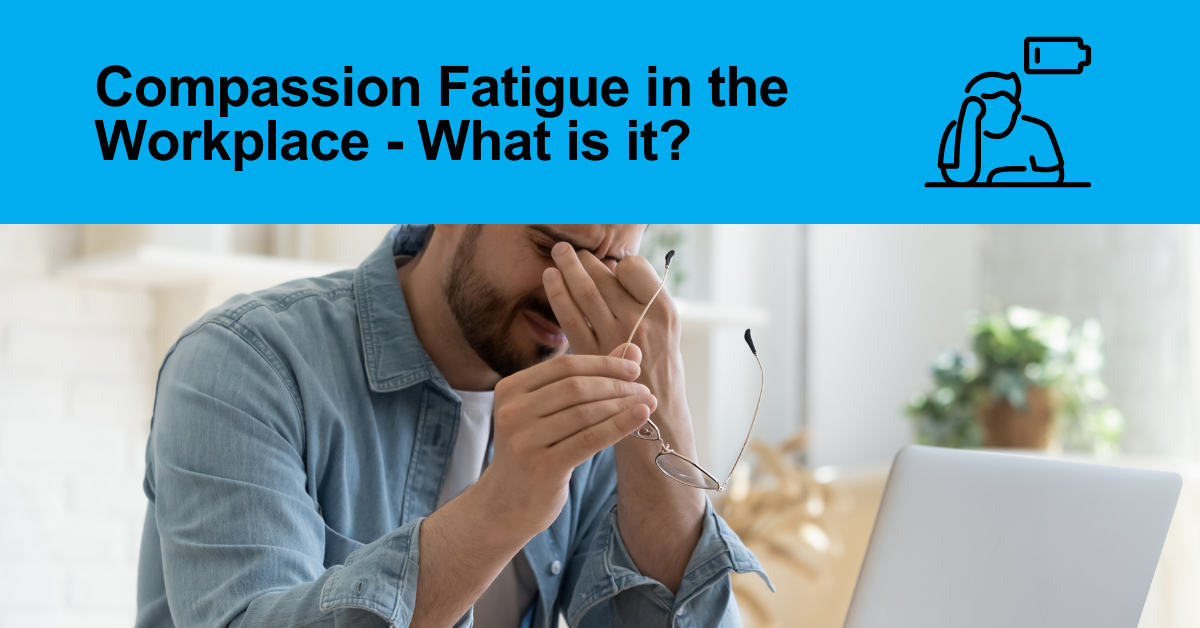Compassion Fatigue in the Workplace – What is it?

When growing up, we all learn the significance of compassion, and in the workplace, it fosters employee well-being, enhances team dynamics, improves customer satisfaction, stimulates innovation, and contributes to a positive organisational culture. It nurtures strong relationships, encourages open communication, and drives overall success and growth for the company. Amidst the challenges facing the economy, supporting your teammates consistently can be physically and emotionally taxing.
The term “compassion fatigue” came about in 1992 with medical professionals. It results from healthcare workers’ excessive exposure to trauma and is often mistaken for burnout. Compassion fatigue can impact individuals beyond the medical field. When job-related stressors and triggers infiltrate their daily thoughts, mood, and overall well-being. Some may describe feeling overwhelmed by distressing situations to the point of experiencing emotional numbness. There are also other factors in life such as the cost of living, changing market insecurity, and the pressure of social media. Add this to the workplace and you may start to feel fatigue.
In workplaces where leaders fail to provide adequate support, compassion fatigue can cause problems. Employees dealing with this may be overwhelmed by negative emotions, making it hard to get along with others and stay focused. Signs include feeling extra tired, having trouble thinking clearly, and acting differently at work, home, or both.
- Feeling upset, like being angry or irritable, is a common sign.
- It can make getting along with coworkers tough and make people feel disconnected from work.
- It might also make it hard to think clearly and make good decisions.
- People might start acting differently at work, like missing more days or working extra hours.
Moving from compassion fatigue to compassion resilience
While it's undoubtedly important to develop resilience individually, research by Panagioti et al. (2017) is clear that interventions aimed at the organisational level have a more significant effect on enhancing health and well-being compared to individual-level efforts. Minor adjustments could be as simple as reminding employees of the significance of incorporating breaks into the workday making sure they take breaks, and stressing the importance of self-care practices such as going for a rejuvenating outdoor walk and taking a leisurely lunch break, rather than hastily eating at your desk. Maybe make eating lunch at the desk prohibited. I have been a victim to this myself, rushing to eat and work at the same time even though I know I should not do it. Another measure in tackling compassion fatigue involves introducing training initiatives that recognize and tackle the emotional strain associated with job roles. This may involve inviting personal devilment and mental well-being health professionals to conduct on-site workshops for employees, covering areas such as stress management, emotional resilience, and self-compassion. By adopting this approach, workplaces not only encourage conversations about emotional wellness but also integrate them as a regular aspect of the organisational culture.
The encouraging news is that there are practical measures you can implement to combat compassion fatigue within both you and your team and in turn restore emotional wellness in the workplace. For many individuals, compassion fatigue is a temporary condition, signaling the need for a break and a more balanced work-life routine. By heeding these cues and taking appropriate action, your enthusiasm for your work and others will likely resurge.
Arcadia Recruitment are specialist in Architecture, Design, and Planning in Brisbane if you would like help with finding your new role, please feel free to get in touch for a confidential discussion.
Caroline Sanders – Director of Arcadia Recruitment
